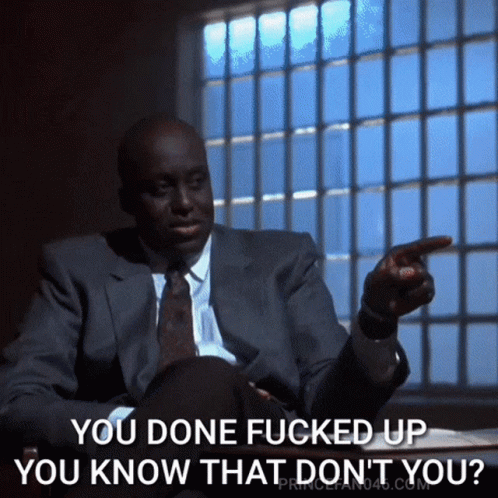|
I’m not an expert but I remember reading that the Sri Lanka gov’t defeating the Tamil Tigers was the famous lesson about insurgencies. For 30 years the Tigers won by not losing, in the classical insurgency fashion, but then tried to form a ‘real’ military and were utterly destroyed.
|
|
|
|

|
| # ? Apr 25, 2024 05:56 |
|
Remulak posted:I’m not an expert but I remember reading that the Sri Lanka gov’t defeating the Tamil Tigers was the famous lesson about insurgencies. For 30 years the Tigers won by not losing, in the classical insurgency fashion, but then tried to form a ‘real’ military and were utterly destroyed. I haven't thought about the Tamil Tigers in years. I've read of them in passing, with less depth than a US Times article, so off to Google. Also, free push for the awesome (was awesome for the first 12 issues or so) The Massive, and awesome post apocalypse comic.
|
|
|
|
bulletsponge13 posted:I wrote a paper a million years ago for class on the failure of American COIN doctrine. One of the reasons I listed- and this is my own posit- that all of the successful ones had a cultural knowledge of the region in which they were fighting, along with a long standing history of cultural exchange. Most often this was in former colonies/colonial proxies, but I think there is a point there. You're spot on, IMO. From what I'm reading of Ucko's articles on clear hold build, lack of cultural understanding, and the dynamics at play in each village, neighborhood, etc.; ignorance of local power structures and methods of rudimentary governance outside of state control, all that leads to failure in COIN if not adequately accounted for. Clear is the easy part, the other parts, but the transition from hold to build is critical and must be handled carefully. I will eat real quick and post up some articles tonight or tomorrow. Tl;dr for this one: Clear, Hold Build is easy to parrot out, extremely hard to implement. The AO is not a tabula rasa or a sheet of white paper for you to spread out onto. That poo poo is a brightly colored mosaic. Figure out what tile you are on and the composition of the human terrain around you, and know the culture in and out. Night raids were another thing that came across my desk. Talked to my buddy Dave who did combat tours with SF in Afghanistan Another case of lack of cultural knowledge. If you're going to snatch an Afghan out of his house, causing him such an extreme loss of face because he's responsible for defending himself, his family, his community, etc., you are turning them into an enemy, and no amount of "we're sorry" fixes that one.
|
|
|
|
The problem with the night raids is they end up abused like No Knock Raids in the States. They become the standard because it looks good, is fun, and supposedly provides less risk to the assaulters/raid team. The problem is the intel is wrong more than it's right, we put the locals at greater risk, and ruin any good will we develop. It's a balance America as a whole doesn't do well. Part of the problem is American love affair with SoF; as we abused the concept and developed the doctrine of GWOT, we diluted the versatility. Soon, they were being used mostly for DA, coming in, doing their poo poo, and leaving a mess for the locals. Besides the loss of face, imagine the loss in rapport for the land holding unit, who can't explain what the gently caress just happened, and will be targeted.
|
|
|
|
First I'm gonna drop this annotated bib in here. Then I'm gonna talk some poo poo before I close read some punk motherfucking Norwegian's autobiographical novel for class on Thursday.quote:Ahern, Colin. “Clear, Hold, Build: Modern Political Techniques in COIN.” Research Paper. University of Military Intelligence, Fort Huachuca, January 1, 2008. https://apps.dtic.mil/sti/citations/ADA495007. bulletsponge13 posted:The problem with the night raids is they end up abused like No Knock Raids in the States. They become the standard because it looks good, is fun, and supposedly provides less risk to the assaulters/raid team. Yeah idk what else to say besides you're spot on. Anyway, rn my thoughts on COIN are as follows. 1. Obviously, short of genocide, you can't kill your way through this poo poo. But it helps if you do it right. 2. Clear-Hold-Build without actual cultural understanding at the micro level, and understanding how poo poo differs from one AO to the next, or one theatre to the next, or EVEN ONE loving NEIGHBORHOOD OR VILLAGE TO THE NEXT, is kinda gonna die on the vine. Gotta know who calls the shots, who has legitimacy in the 'hood, and who doesn't. And what's their relationship with the state historically? Apparently, Somalia manages to conduct business and has rudimentary governance via informal power structures. Whenever someone tries to put up some form of central government, the government basically rapes the periphery with corruption and abuse. Apparently, they got a bad rap for a really good reason in that history. 3. This dude named Dostum apparently was a big reason that the marxist regime in Afghanistan didn't fall for ACTUAL loving YEARS BATMAN. And I'm looking into him and his COIN tactics, and chatting up the professor who wrote the book "The Last Warlord" tomorrow. Tl;dr it looks like what happened from 89-91 is what I would call "tactical containment" aka whack a mole. I haven't read enough to confirm, but according to my mentor who knows about this time period, even though the soviets hosed off, they kept the money and the fuel going, and left the afghan govt all their equipment. More on that here (https://mepc.org/commentary/lessons-soviet-withdrawal-afghanistan). Tl;dr, the Muj tried them at the Battle of Jalalabad and got loving chaos dunked. I mean they apparently were able to actually use SCUDs on the muj, and....that's not a loving tactical fire support weapon dude. That's pick a letter, NBC, and send that poo poo up. Anyway, I'd love to read up on that one to confirm what I'm being told. They apparently had spotters throughout Afghanistan to warn them of the Muj showing up. If Muj showed up, Dostum rolled out and conducted a security flood. This kept things stable until the afghan govt tried to gently caress Dostum and until the fall of the Soviet Union meant that the money dried up. 4. Do not buy an army on the cheap. Use smaller, well trained, well paid, loyal troops to gently caress dudes up. Once you got em contained, THEN do that clear-hold-build poo poo. But do it right. 5. The AO is not a tabula rasa. That poo poo is a brightly colored mosaic. You cannot inkblot over it like it's a blank sheet of paper. Its not. 6. Therefore, know the culture, history, and human terrain of the tile you are on and act appropriately.
|
|
|
|
Unrelated, but this thread might the only time in my life I felt like I actually knew what the gently caress I was talking about.
|
|
|
|
bulletsponge13 posted:Unrelated, but this thread might the only time in my life I felt like I actually knew what the gently caress I was talking about. I know you do. You lived it, you were there. I can read off what the academics say and what some loving officer wrote as a research paper when they were at a war college, all day. They didn’t stand the watch, they didn’t talk to those people. They didn’t see the bloodshed, shed the tears, or have to fight every day they were out there. You did. Everyone else who can speak to that same experience did. As long as you and others who were there speak on it, I will listen humbly. TheWeedNumber fucked around with this message at 17:41 on Feb 8, 2023 |
|
|
|
Reading an old MilHist A/T thread, this question came up, and someone made the point that in many cases, the COIN forces won by default- Unable to defeat the Insurgents, they lost control. Insurgents are often really good at fighting and winning a war, but no experience running a state- which means in short order, the Status Quo comes back.
|
|
|
|
bulletsponge13 posted:Reading an old MilHist A/T thread, this question came up, and someone made the point that in many cases, the COIN forces won by default- Gonna bring this up tomorrow with my mentor. Really good insight, thank you for sharing it with me. Did any particular conflicts come to mind?
|
|
|
|
TheWeedNumber posted:Gonna bring this up tomorrow with my mentor. Really good insight, thank you for sharing it with me. Did any particular conflicts come to mind? There was a small list- let me see if I can find the post and link it. E- post kicks off here, and is scattered about for a fee pages https://forums.somethingawful.com/showthread.php?threadid=3872282&pagenumber=244&perpage=40&userid=0#post493087530 Interesting post with Rand article on Rhodesia that I haven't read yet. https://forums.somethingawful.com/showthread.php?threadid=3872282&pagenumber=244&perpage=40&userid=0#post493089336 bulletsponge13 fucked around with this message at 19:41 on Feb 11, 2023 |
|
|
|
We touched on insurgencies in my class I'm currently taking through the Naval War College ( it was only a couple days of lectures), but yeah the general takeaway is that insurgencies are really freaking hard to fight and if you're fighting against a liberation-type insurgency (i.e people fighting to free their country from an occupation or foreign power), in general unless you use those genocidal methods mentioned earlier in the thread, you're going to lose. Learning about the Tamil insurgency in Sri Lanka was really fascinating, it was probably one of the only modern cases where the insurgency was predominantly maritime based.
|
|
|
|
It's not as straightforward of an example as others in the thread have provided, but would the Polish People's Republic count? Towards the end of WW2, Stalin installed a puppet government in the newly liberated areas of Poland and had the rest of the allies recognise its legitimacy over the Polish Government-in-Exile in London at Yalta. This left the Home Army, the Polish resistance movement in a weird spot. Instead of disbanding, some units chose to continue their resistance after the war ended, becoming a miniature anti-communist insurgency. They were eventually all wiped out towards the late 1950s and the Polish communist state continued until 1989, when Other Historical Events™ happened. Then, the "cursed soldiers" became rehabilitated, which is Extremely Icky because a lot of them were hella antisemitic and far-right. Currently, they're the darlings of our local fashies and every government has to pay lip service to their "indomitable fight against communism" or whatever.
|
|
|
|
It was posted earlier, but I just saw it so...now you get to deal with my digging it up. As a historian of slavery, I wouldn't go the route of slave rebellions as successful counterinsurgency, especially the Maroons. The Maroons are a very distinct case in Jamaica and seem to me to be much more of a one-off of accommodation than successful counterinsurgency (though the British were ultimately able to co-opt them into acting as slave catchers for most of the 18th century). Slave revolts as a whole I don't think fit, as it seems like a very different game that is being played by enslaved people, especially in the Atlantic-American chattel slave system. Short revolts like Nat Turner's rebellion or the Bahia revolt don't have the staying power to be seen as true insurgencies on the scale of something like Northern Ireland or the Mau Mau. Longer revolts -- Haiti really being the only modern example that one can dig into in the West -- sees too much shifting of alliances between freed blacks and Europeans of various stripes to ever allow a historian to settle on who the insurgents are. The obvious answer is the Haitians, but how do you count them as insurgents when Spain, the UK, AND France all ally with them at one point or another during the conflict? They are the only group that actually stays on their own side -- and even they splinter -- throughout the entirety of the revolt. Who is the counterinsurgency to who? What about the Boxer Rebellion, or the Sepoy Mutiny? Though in both of those cases, non-Western people suffered the lion's share of casualties, and deaths ran into the hundreds of thousands. The Canada Revolts of 1837-8 maybe?
|
|
|
|
So I'm doing Vietnam and Afghanistan for this paper. Today I wanna talk a lil bit about the CIDG program. tl;dr HOLY poo poo BIG ARMY WHY MUST YOU RUIN EVERYTHING?!?!! Even misused those CIDG dudes were banging the gently caress out. And done properly, that poo poo certainly was Shape, Clear, Hold, with a bit of Build on the side. All one had to do to keep a good thing going was SUSTAIN. It started in Buon Enao with two dudes, a green beret medic and some fuckboi from the embassy or US Mission or whatever their status was. It ended up with an entire province secured before MACV hosed it up. idgi, this COIN thing can actually loving work and idk why motherfuckers wont let it.
|
|
|
|
Because failure is a feature, not a bug. I've given thought to contacting the war college and offering to do a talk about what the failures looked like from the knife edge, but the more I thought about it, the more I realized they wouldn't care. They are paid and trained not to.
|
|
|
|
bulletsponge13 posted:Because failure is a feature, not a bug. can I hit you up when I get that PhD and start talking to these motherfucker myself?
|
|
|
|
What is the point of "winning" against an insurgency? Specifically as the US, what do we gain? Is remaking a country into a western style democracy really THAT important? There's a slew of failures to point to, which makes fighting these conflicts look like a waste of lives and resources that could be put to better use doing something else entirely.
|
|
|
|
Mustang posted:What is the point of "winning" against an insurgency? Specifically as the US, what do we gain? Is remaking a country into a western style democracy really THAT important? i had like 5 french 75s and a vesper martini today. but i just want you to know I saw this and imma hit you back when i sober up
|
|
|
|
Mustang posted:What is the point of "winning" against an insurgency? Specifically as the US, what do we gain? Is remaking a country into a western style democracy really THAT important? That is part of the problem that America has- we never actually have victory conditions. I've always operated under the the assumption that America's end goal is an independent sovereign nation to act as an ally in a region; the way we do it, it's to maintain a proxy cause puppet to force project foreign policy with little to no regard for regionally allies. I realized today we never lost the war. We were never meant to win it. There were no victory conditions. There was no Berlin or Paris, no river, ridge, or phase line. There was conditions of victory.
|
|
|
|
bulletsponge13 posted:That is part of the problem that America has- we never actually have victory conditions. by contrast, the russians remain quite effective against it so long as you're willing to embrace the worst state possible to maintain peace in your stead, you _can_ win counterinsurgency just side with the leading insurgent faction and rest comfortably that they have no reasonable chance of forming an independent sovereign nation admittedly this works less well when they're outside your historical contiguous borders ideally you're also sort of at war with everyone adjacent
|
|
|
|
Mustang posted:What is the point of "winning" against an insurgency? Specifically as the US, what do we gain? Is remaking a country into a western style democracy really THAT important? Ok, quick ask: what insurgency and where? This is a really general post, and I can't spit out answers if we aren't talking about specific conflicts. The only thing I can touch on right now is the "western style democracy nation building bit." I agree with you that part is unnecessary. You only need to build up the HN and its security forces enough to contain the insurgency so you can GTFO. That sounds like we're talking about Iraq and Afghanistan, with mission creep and unnecessary idealism loving up the process. "There's a slew of failures to point to, which makes fighting these conflicts look like a waste of lives and resources that could be put to better use doing something else entirely." There were also successes from the 19th century onward from what the research is telling me. There are parts of the Vietnam War that I'm staring in the face of (Civilian Irregular Defense Program pre-MACV, Marine CAPs pre-being forced into search and destroy) where I'm seeing Shape, Clear, Hold, and even a bit of Build WORK in the wild. It's entirely possible for something to work up until the point some dumb gently caress in the brass or government overrides the people doing the actual work of counterinsurgency. And that's what I see when I look into this one. My assessment at this point is COIN COULD HAVE WORKED everywhere I've seen it utilized (Vietnam, and Afghanistan, haven't dug deep into Iraq yet.) . In Afghanistan, Malkasian's book on it informs my view heavily as does my mentor (cited below). I can definitely admit being biased by what a Green Beret veteran is telling me about the world. However, I haven't heard anything that didn't make sense when checked with other sources. I think Iraq was an unnecessary loving war. I think Afghanistan could have had multiple offramps for us, especially in 2001-2002. We wanted blood and did not differentiate between Taliban and AQ. We never even really gave peace a chance. And, tbqh, having read some of the poo poo in Malkasian about them denying AQ responsibility for 9/11 to our faces during negotiations in Doha, I'm of the opinion that they should have been exterminated for that alone. But that's an extreme opinion. The practical opinion is this: If we went in, hosed them up, and brought in our own troops at Tora Bora instead of utilizing hesitant militia to take a shot at Bin Laden, we might have stood a chance at preventing him from slipping out the net. We bag that buck, and we can go home. Not like right right away: we gotta get motherfuckers to the negotiating table (INCLUDING THE TALIBAN) and straightened out the political situation enough that Karzai would have been able to hold his own. We bring in 5th SFG and 19th SFG, maybe one more, and have them train up his entire loving army (Eikenberry a dummy for pulling SF off that detail, please see what 5th SFG alone did during the CIDG program). We don't bother doing haphazard nation-building or trying to change the culture because Nancy Pelosi and Hillary Clinton have some qualms about how Afghan culture really works. Instead, we stabilize the place enough to ensure its not a AQ safe haven, ensure the Afghans can contain any further insurgency or Taliban incursion across the Durand line, and bounce before we get bogged down any further. That's offramp one. We could have been in and out within a few years and left the Afghans to it, with or without our support. Preferably with as little overt support from us as possible so that Karzai wasn't seen as an American puppet. Offramp two would have been during the surge and involved loving with the timetable. The surge was unnecessary, IMO, from a population security and control standpoint. But it got done in Helmand and Kandahar and it did work as long as the gains were SUSTAINED. All Obama really needed to do was bring these fuckers to the negotiating table again, threaten the Taliban that we might stay for good and throw the timetable out the motherfucking window, and give Khalilizad some real leverage to negotiate peace. Get the peace process done, ensure its not a safe haven for AQ, mission accomplished. Ensure they have the army needed to contain any further insurgency then bounce. Offramp three apparently was during Trump and that dumb orange motherfucker apparently had these taliban fucks shook. A broken clock is right twice a day and, while I refuse to hand it to him, donnie from home alone 2's erraticism worked for us in some ways. He was down to dip on a deal if he ain't like what he was hearing or didn't get his diet coke on time with a handjob thrown in. All of that is an extreme oversimplification of what is a highly complex environment. I didn't talk about political personalities, tribal infighting, Karzai loving around with the tribes, Rumsfeld loving us initially, the Korengal (where we should have never been in the first place), accidental guerilla "syndrome," Col Tunnell being a piece of poo poo, Pakistan's ISI and regime supporting the Taliban, the Durand Line and what it meant for the region, subtribes within tribes, what could have happened if we let Dostum just run amok and closed our eyes, none of that. All I can say for sure is, based on what I've been reading, it reads like a loving tragic comedy. I've seen heroic poo poo happening and recounted to me on these pages I've been reading. The part that kills me is none of this poo poo needed to play out the way it did. It was a dance that needed to be in sync, choreographed to the realities of the time and the players involved. THAT'S Why lives and resources were wasted. That's why our bros and sisters died for loving nothing. As best I can tell, the fault always comes back to the political leadership of the times: ours and theirs. The generals weren't as bad as they were in Vietnam (Hi Harkins and Westy, you pieces of absolute dogshit), but I still saw some hosed up poo poo on that front pre-McChrystal and Petraeus. And both of the latter played politricks and loving lost hard. Matter of fact if I ever am blessed enough to be in a room with McChrystal, at some point that rolling stone poo poo is gonna come up and I'm gonna be doing this bit:  Petraeus too though I don't think my mentor can put me in a room with him. Probably wouldn't want to, we don't like Petraeus anyway. poo poo re: Vietnam, if they just listened to John Paul Vann before the war hit the point of no return, that one could have turned out different too. Then again, John Paul Vann forgot to be objective in the end. Least he died before he watched it all fall apart. Same for CIDG, if you just let the Special Forces run that poo poo defensively and do Shape, Clear, Hold, Build. And let them SUSTAIN IT; you could have done pacification correctly. Let me get back to you on Vietnam in a different post. That one is the tragedy of tragedies. That one I can lay directly at the feet of Big Army and Lyndon B Johnson. They loving wasted us wholesale there. I don't even know where to begin with that. tl;dr point is I keep seeing poo poo where COIN works. Suppose COIN just got done right, even accounting for every conflict needing a tailor-made, made-to-measure political/cultural/socioeconomic solution. In that case, the general questions you must ask yourself as a practitioner and what you must do can be pretty straightforward. It's the military science of population control. If you remembered nothing else but "control the population and protect them from all threats, including yourselves," you would do better than Westmoreland or Harkins did in Vietnam. You would get CIDG or CAP naturally. Matter of fact, speaking of my beloved Marines, they've been involved in more "small wars" than a little bit. They made it work historically. Where are their slew of failures? The failures seem to come post-WWII courtesy of the US Army and dumb political leaders. Anyway, here are some of my most pertinent sources for what we're discussing right now. This is a short list that informs what I'm saying and why I'm saying it. quote:
This is missing the CAP poo poo because I haven't finished reviewing it and throwing it up into my working annotated bib, but it's what's informing me and my research for the most part. This is just like some of the poo poo I've read that's most pertinent. Qtotonibudinibudet posted:by contrast, the russians remain quite effective against it While the Russian way of war could be considered a COIN approach, I still need to research it and I can't really speak on this one. All I can say at this time is uhhhhhh idk about this one chief. Yeah if you kill LITERALLY EVERYONE or kill their culture it works too but I don't think the russians did that either. they may be genocidal but they never finished the job. They're cruel just to be cruel. TheWeedNumber fucked around with this message at 15:16 on Apr 23, 2023 |
|
|
|
bulletsponge13 posted:That is part of the problem that America has- we never actually have victory conditions. Vietnam is now a US ally. Somehow, does this mean, in the very long term, that the US has won the Third Indochina War?
|
|
|
|
Fivemarks posted:Vietnam is now a US ally. Somehow, does this mean, in the very long term, that the US has won the Third Indochina War? They shoulda been allies from the start but nobody wanted to give Ho Chi Minh the time of day. loving white people.
|
|
|
|
TheWeedNumber posted:They shoulda been allies from the start but nobody wanted to give Ho Chi Minh the time of day. loving white people. Turns out letting "No, it was about States Rights" Wilson be president was a bad idea. But also, we probably should've listened to ho Chi Minh either at Versailles, or after WW2 when he was like "hey thanks for helping us push out the japanese, now you wanna let us be independent?"
|
|
|
|
Fivemarks posted:Turns out letting "No, it was about States Rights" Wilson be president was a bad idea. But also, we probably should've listened to ho Chi Minh either at Versailles, or after WW2 when he was like "hey thanks for helping us push out the japanese, now you wanna let us be independent?" you ain't got no argument from me. I think the thing ho chi minh realized late is we're just as imperialist as the colonizers were. we just like to keep our poo poo on the low. We say one thing and do another from what I can make of our history. It's a crying shame
|
|
|
|
It didn't help that the French said "Shut the gently caress up about our colonialism or we'll get in bed with the Soviets" early on, but all we did in Vietnam was cover ourselves in infamy.
|
|
|
|
Fivemarks posted:Vietnam is now a US ally. Somehow, does this mean, in the very long term, that the US has won the Third Indochina War? They only became a limited ally to hedge against the Chinese after the 79 Sino Vietnamese War- that Vietnam loving WON- against all rational thought, they beat the Chinese and won proper recognition of borders, IIRC. Which is funny, because there is a school of revisionism that has gained some traction that the US fought the Vietnam War to stop Chinese Expansion. Which makes no loving sense, but what do I know. I recently had someone with all sincerity claim the Japanese won a Counter Insurgency by killing their way to victory post WW2, during the US occupation. When I asked for sources, he disappeared. When I pointed out that Japan had little to do with that extremely limited (I couldn't find any real numbers of 'Werewolf' or post August insurgent acts, but I didn't dig too far), and that it was more to do with Allied operations and pressure- and you know, wanting to continue to exist in some familiar form- my sexuality was questioned. E- A.o.D. posted:It didn't help that the French said "Shut the gently caress up about our colonialism or we'll get in bed with the Soviets" early on, but all we did in Vietnam was cover ourselves in infamy. bulletsponge13 fucked around with this message at 21:15 on Apr 23, 2023 |
|
|
|
“The West is still battling an ideology with technology,” he concludes with remarkable prescience, “and the successful end of that Revolutionary War is neither near nor is its outcome certain.” In a final chapter, Fall stresses the importance of what he calls “revolutionary war.” Defining it as the “application of irregular warfare methods to the propagation of an ideology or political system,” he carefully distinguishes revolutionary war from guerrilla or partisan war. Because of its political dimension, Fall insists, revolutionary war cannot be dealt with by military means alone. He criticizes the Americans for following the French in trying to use technology to compensate for “the woeful lack of popular support and political savvy” of the regimes they tried to prop up. Quoting approvingly a slogan posted on barracks walls in the First Indochina War—“Remember—the enemy is not fighting this war as per French Army regulations”—he warns that revolutionary war will continue to pose a challenge and that dealing with it cannot be left to “happy improvisation.” The West must understand it and learn how to fight it. Have Fall’s arguments stood the test of time? Were they validated or discredited by the Second Indochina War? The debate on these issues remains as heated today as in Fall’s time. Some analysts of the war stress that the United States, by accident or design, had thwarted the enemy’s revolutionary war strategy by 1968, particularly as a result of the disastrous Communist Tet Offensive. Ultimately, they contend, the United States and South Vietnam were defeated by conventional North Vietnamese armies that were supplied by the Soviet Union with conventional weapons and overwhelmed their South Vietnamese counterparts in the most conventional of operations.1 Nevertheless, many scholars still subscribe to arguments much like Fall’s. In words reminiscent of Street Without Joy, John Gates contends that “revisionist” interpretations advanced in recent years neatly fit the conventional thinking that has typified the U.S. military throughout the twentieth century. They err, as those Fall criticized, by equating revolutionary war with guerrilla war. In fact, Gates contends, in the period after Tet, the enemy continued to carefully integrate and skillfully employ all aspects of warfare. It used protracted warfare to undermine the position of the United States. It used guerrillas in coordination with conventional operations for intelligence and logistics, in combat, and for political agitation to undermine the South Vietnamese government. Thus, he concludes, “the 1975 attack was the coup de grace of a successful peoples’ war rather than the coup de main depicted in many recent American accounts.” Like Fall, Gates notes that the United States has learned nothing from its failure in Vietnam because it has refused to recognize the true nature of the war that was fought there Fall, Bernard B.. Street Without Joy: The French Debacle in Indochina (Stackpole Military History Series) . Stackpole Books. Kindle Edition.
|
|
|
|
TheWeedNumber posted:you ain't got no argument from me. I think the thing ho chi minh realized late is we're just as imperialist as the colonizers were. we just like to keep our poo poo on the low. We say one thing and do another from what I can make of our history. It's a crying shame Doesn't this imply that the argument about how to win a counterinsurgency conflict is just a distraction from the poor ethical choices that lead to intervention in the first place? You can argue about tactics until you're blue in the face, but maybe it's just easier not to insert the military into civil wars and regional conflicts? The historical record is that this intervervention only deteriorates the situation for the people living there even if you give everyone the benefit of the doubt about stated goals around stability and democracy. quote:I think Afghanistan could have had multiple offramps for us, especially in 2001-2002. We wanted blood and did not differentiate between Taliban and AQ. We never even really gave peace a chance. And, tbqh, having read some of the poo poo in Malkasian about them denying AQ responsibility for 9/11 to our faces during negotiations in Doha, I'm of the opinion that they should have been exterminated for that alone. But that's an extreme opinion. Your longer post focuses on Afghanistan and even appears to justify an invasion as something that was necessary post 9/11, but it really just wasn't no matter how it was carried out. US boots on the ground involved in overthrowing the Taliban was going to create a civilian death toll in the tens of thousands even in the best case scenario. IMO once you're talking about COIN tactics most of the time you've already lost the plot about what your overall goals are or why you're involved in the mess in the first place. Casino rules apply, the only way to win is by not playing. AreWeDrunkYet fucked around with this message at 21:43 on Apr 23, 2023 |
|
|
|
PookBear posted:“The West is still battling an ideology with technology,” he concludes with remarkable prescience, “and the successful end of that Revolutionary War is neither near nor is its outcome certain.” In a final chapter, Fall stresses the importance of what he calls “revolutionary war.” Defining it as the “application of irregular warfare methods to the propagation of an ideology or political system,” he carefully distinguishes revolutionary war from guerrilla or partisan war. Because of its political dimension, Fall insists, revolutionary war cannot be dealt with by military means alone. He criticizes the Americans for following the French in trying to use technology to compensate for “the woeful lack of popular support and political savvy” of the regimes they tried to prop up. Quoting approvingly a slogan posted on barracks walls in the First Indochina War—“Remember—the enemy is not fighting this war as per French Army regulations”—he warns that revolutionary war will continue to pose a challenge and that dealing with it cannot be left to “happy improvisation.” The West must understand it and learn how to fight it. Have Fall’s arguments stood the test of time? Were they validated or discredited by the Second Indochina War? The debate on these issues remains as heated today as in Fall’s time. Some analysts of the war stress that the United States, by accident or design, had thwarted the enemy’s revolutionary war strategy by 1968, particularly as a result of the disastrous Communist Tet Offensive. Ultimately, they contend, the United States and South Vietnam were defeated by conventional North Vietnamese armies that were supplied by the Soviet Union with conventional weapons and overwhelmed their South Vietnamese counterparts in the most conventional of operations.1 Nevertheless, many scholars still subscribe to arguments much like Fall’s. In words reminiscent of Street Without Joy, John Gates contends that “revisionist” interpretations advanced in recent years neatly fit the conventional thinking that has typified the U.S. military throughout the twentieth century. They err, as those Fall criticized, by equating revolutionary war with guerrilla war. In fact, Gates contends, in the period after Tet, the enemy continued to carefully integrate and skillfully employ all aspects of warfare. It used protracted warfare to undermine the position of the United States. It used guerrillas in coordination with conventional operations for intelligence and logistics, in combat, and for political agitation to undermine the South Vietnamese government. Thus, he concludes, “the 1975 attack was the coup de grace of a successful peoples’ war rather than the coup de main depicted in many recent American accounts.” Like Fall, Gates notes that the United States has learned nothing from its failure in Vietnam because it has refused to recognize the true nature of the war that was fought there Really appreciate this one Pookie. There was an article I read (listed in that bib) that talked about Bernard Fall. His book is on that long list of things I need to read. Its reminding me of another book I need to read: Unrestricted Warfare. This one got put out in the 90s. That first sentence rings true then and now. Can't kill an idea. Can't kill one that's closer to being "right" than the one you're putting out.
|
|
|
|
For winning politically, I would argue that FDR won in the US. minimum wage, social security, etc meant that a revolution wasn't needed the same way as it was in russia, where the alternative to communism was an imperialist monarchy. We were never willing to push for these types of social programs externally though with any sort of sincerity. The funniest example of this is us trying to build schools in Afghanistan. Instead of building a civil system, we built hollow buildings with the wishful thinking they would magically be staffed.
|
|
|
|

|
| # ? Apr 25, 2024 05:56 |
|
AreWeDrunkYet posted:Your longer post focuses on Afghanistan and even appears to justify an invasion as something that was necessary post 9/11, but it really just wasn't no matter how it was carried out. US boots on the ground involved in overthrowing the Taliban was going to create a civilian death toll in the tens of thousands even in the best case scenario. I wouldn't have invaded if the Taliban handed over bin Laden and AQ to us. Mullah Omar was a loving idiot but we also didn't to do more than give lip service to a peaceful outcome. Really, from what I can tell, we wanted them to give us a reason to invade. And they did. As for the purpose of my longer post, its more trying to talk about what I think Mustang is talking about and speaking to what I'm actively researching. AreWeDrunkYet posted:Doesn't this imply that the argument about how to win a counterinsurgency conflict is just a distraction from the poor ethical choices that lead to intervention in the first place? You can argue about tactics until you're blue in the face, but maybe it's just easier not to insert the military into civil wars and regional conflicts? The historical record is that this intervervention only deteriorates the situation for the people living there even if you give everyone the benefit of the doubt about stated goals around stability and democracy. It doesn't say that, though. It's easier to be a coward, though, and shirk duty because figuring out how to bring a complicated conflict to a satisfactory conclusion, whatever the hell that looks like, is too complicated compared to just killing everyone or running away. That's undoubtedly the post-Vietnam view Big Army took. It's why we had the Powell doctrine develop, from what I can tell from reading Krepenevich. In that sense, I can agree with your statement. Going in blind and recklessly into conflicts where we don't really understand the place or have a clear picture of our interest in the region is something I'm against. But not getting involved in a civil war when it makes sense to, just because it's easier not to? Or getting involved in some regional conflict because it's a bit harder than straight-up conventional warfare? Disagree. We let Rwanda happen under our watch because "The United States has national interests, and we have no interest in Rwanda." Wouldn't that have been a nasty civil war to get involved in? A literal ethnic conflict wherein one side went full-on genocide. Romeo Dallaire is still drinking to forget that one last I checked because he had to sit there and loving watch. How about I sum up why I'm doing this research and why I'm going all the way with it, going after a straight-up Ph.D. cause of this poo poo? I'm doing this because I believe that it's the duty of the armed forces to master all forms of warfare it is called upon to engage. We don't get to just shrug and be like, "we don't like this form of conflict, its complicated." Our job is to figure out how to make the poo poo work out. Insurgencies will happen. Civil wars will happen. Ethnic strife will happen. Not every conflict is our problem, but the ones that are require us to be able to act intelligently and decisively. I'm not saying it's easy, far from it. It's probably the most complicated form of warfare out there because of all the elements involved. But we need to master it because it's gonna happen again. Either master that or figure out world peace ASAP because otherwise, the need for it is gonna be there. And world peace doesn't look like it's happening anytime soon. As for the historical record you are referring to, I have no reason to doubt you, but you're telling me something without receipts and I am unable to verify what you are telling me as anything but a thing that "sounds plausible" because I'm no historian, and I'm not as familiar with what you're talking about as I need to be. Can you do me a favor and throw me something to look at or into during the summer? I'd really appreciate that. AreWeDrunkYet posted:IMO once you're talking about COIN tactics most of the time you've already lost the plot about what your overall goals are or why you're involved in the mess in the first place. Casino rules apply, the only way to win is by not playing. I mean I appreciate you engaging with me but I'm not gonna roll with you on that one. And I don't think its a casino rules situation either. I don't think the thing is as simple as you make it or that a motherfucking "COINista" like Kilcullen makes it. The only thing I know for sure is the whole show is loving wild. I think we can agree on that much. PookBear posted:For winning politically, I would argue that FDR won in the US. minimum wage, social security, etc meant that a revolution wasn't needed the same way as it was in russia, where the alternative to communism was an imperialist monarchy. concur p much with this one. not seeing nothing wrong here TheWeedNumber fucked around with this message at 22:15 on Apr 23, 2023 |
|
|

















